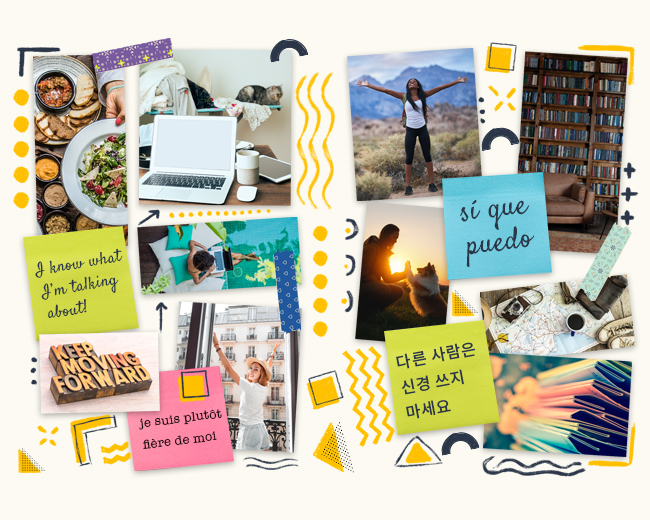Learning a new language can be challenging. Now imagine trying to defend yourself in a new language… in a foreign country… in an uncomfortable situation. A bit more challenging right? The (sad) reality is that as women, we are exposed to uncomfortable scenarios at a disproportionately uneven rate to men. So with International Women’s Day and Women’s History Month upon us, the Memrise team decided to do something constructive about it.
Led by some of the brightest and baddest women at Memrise, we developed a collection of phrases in six of our most popular languages (French, German, European Spanish, Mexican Spanish, Korean and Japanese) to equip women around the world with statements designed to empower them wherever they may be. Whether it's responding to unwanted attention while traveling solo on the train, giving a fellow sister a boost of confidence or stopping a narrow-minded co-worker from speaking over you (insert Kamala Harris “I’m speaking” meme) - a woman should always be able to speak up for herself.
The making of the phrase collections
As a first step, the many female language specialists and content creators here at Memrise (not to mention our epic Head of Strategic Messaging and Communications who is also *Hair flip* a woman) gathered to discuss how all too often we have found ourselves in difficult situations abroad because of our gender. We found common ground in the fact that we were unsure how to respond to certain situations that made us feel uncomfortable as women. We asked ourselves how we would have preferred to respond at the time and how we would like to respond in future.
Take street harassment for example, this has always been a huge source of anxiety and fear for me. French phrases like “leave me alone” (laisse-moi tranquille) and “no means no” (non c’est non) instantly come to my mind. In Japanese, I really like the sentences “I’m not interested” (興味ありません) and “that's rude” (失礼ですよ).
In terms of mental health, I’m convinced that having words that express our deepest and most complex needs are essential in language learning. It is incredibly powerful to simply express “I need to take care of myself” (j’ai besoin de prendre soin de moi), and in Japanese “love yourself a bit more” (もっと自分を大切に)... even if you only say it to yourself in front of the mirror! Afterall, a big part of finding confidence is in taking care of our mental health and respecting our emotional, physical, and spiritual boundaries as well.
We also wanted to include sentences that can be used to uplift our peers and show them that we’ve got their backs! I love the Spanish phrase “don't let others walk over you” (no te dejes pisotear), and the Korean “I believe you” (전 당신을 믿어요). In German you can say “can you let her finish speaking please?” (kannst du sie bitte ausreden lassen?), which is a great way to advocate for someone.
Addressing the differences in the expressions across languages
The phrases are different in each language because different languages and cultures have different social constructs and stereotypes around genders. For example, although we can agree that people who identify as female, non-binary, transgender, and non-cis are still not treated as equal across the world, there can be different ways to stand up for yourself depending on which culture you live in.
All language carries inherent bias, and this was something we took extra care around addressing in our phrases. For example, the English word “empowerment” doesn’t have an equivalent in French, but its meaning and importance have become so relatable for people identifying as female, non-binary, transgender, and non-cis that some have started using the new word “empouvoirement” as a direct translation. Having words to describe our reality, or conversely, not having them plays a huge influence in how we are seen in the world and how we can present prejudices to others, consciously or not.
“As a speaker of a heavily gendered language such as French (in which, even inanimate objects have a grammatical gender) learning a language that isn’t so gendered (for example Japanese, or even English) helps me recognise how I internally associate some qualities and flaws to different genders.” -Fanny Stassar, Senior Content Producer here at Memrise
Below are a few examples of some of the scenarios a woman may find herself in and how to respond.
Asserting oneself

Kamala set the tone for this one! Sometimes no matter what your title is, a woman needs to put her foot down. Equip yourself with the tools to be acknowledged and respected more confidently.
Self-care

Let’s be real, we all have those days where we just need to be left alone to prioritize ourselves. These translations were developed specifically for those “me time” moments.
Defending yourself

It can be really difficult to find the right words when we find ourselves in situations where we feel wronged or intimidated, especially if the language is new to us. Ideally you are never in a situation that calls for using these statements, but if that ever does happen we want you to be prepared and feel comfortable setting boundaries for yourself or being an ally to someone in need.
Nothing about being human is convenient; our emotions and feelings, the way we identify ourselves (in terms of genders, sexuality, community, etc.) isn’t “convenient.” We don’t choose, we simply are!
Our goal with these phrase courses is to equip all the ladies, and their allies, with the tools to claim a seat at the table (or boardroom). If you have any phrases you’d like to see added to the courses, send us an email at:
olivia@memrise.com, and make sure to sign up for the courses here.








